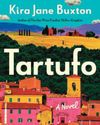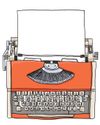
Over coffee recently, a friend described a harrowing moment when, as she was cleaning her canary's cage, the bird escaped.
The cat leaped.
My friend screamed.
Her 3-year-old daughter screamed.
The bird did not survive.
"Well," said my friend as she gazed pensively out the café window, "that's what I get for having a food chain in my house."
The story got me thinking about the fact that a family is, for all purposes practical and symbolic, an ecosystem.
As writers, our first reference point for drama is usually a family.
"Mom and Dad are yelling again."
"Yeah? What about?"
"I dunno. She said, 'Why don't you go to her, then?""
"Really? Who's 'her'?"
"Maybe it's Mrs. Perry down the street."
"Really? Why?"
"I dunno. I just think it is."
The characters we write about, like us, have families of all sorts. When you're putting together an ensemble of characters, consider the myriad variations and possibilities! of family, among them:
• Traditional nuclear
• Blended (stepparents/stepsiblings / half siblings)
• Single parent
• Adoptive/foster/custodial
• Multi-generational
• Polygamous
• Empty nest
• Many siblings
• Only child
• Orphan(s)
• Special needs: medical, mental, emotional
• Widow/widower
• LGBTQ/nonbinary
• Native/immigrant
• Racially homogeneous/diverse
• Culturally homogeneous/diverse
• Pets as family
• The streets (no home)
Then there are groups that feel familial (absent the bond of blood, but perhaps joined together by plenty of sweat and tears):
• Chosen (friends, allies)
• Military / police / first responders
• Clubs / fraternities / sororities
• Religious orders / churches
• Workplace / professional organizations
• Virtual, e.g. internet buddyhood
This story is from the July - August 2024 edition of Writer’s Digest.
Start your 7-day Magzter GOLD free trial to access thousands of curated premium stories, and 9,000+ magazines and newspapers.
Already a subscriber ? Sign In
This story is from the July - August 2024 edition of Writer’s Digest.
Start your 7-day Magzter GOLD free trial to access thousands of curated premium stories, and 9,000+ magazines and newspapers.
Already a subscriber? Sign In

What Is Your Story Question?
Revision and editing advice to take your first draft to the next level.

Writing for the People We Hope to Become
Elisa Stone Leahy's new middle-grade novel, Mallory in Full Color, tackles the in-between moments of adolescence, when who we are and who we want to become collide.

Creating Community
Whether hot off the presses or on the shelves for years, a good book is worth talking about.

Pat Barker
The Booker Prize-winning author of Regeneration shares the role characters play in developing novel ideas and explains what appeals to her about reimagining mythology.

How to Write in Different Genres
Emiko Jean and Yulin Kuang share tips and strategies for how they successfully write in different genres and mediums.

The Shortest Distance Between Two Points
Ten tips for writing a novel with 100-word stories.

Mayfly Marketing
How to sell your novel in a short-attention-span world.

"You'll be a great essay".
How to write six types of personal essays by finding the funny in your life.

The Idea Factory
Tired of staring at an empty screen? Unlock your inner fiction generator with these surprising inspiration techniques.

Seinfeld Was Right: That's a Story
Use mundane moments from everyday life to create stories that pack a punch.